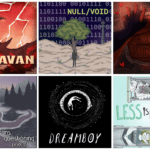PRIDE: The Dildorks Is a Weekly Dose of Queer Belonging

For me, a great podcast is one that regularly prompts me to ponder the topics that have flitted in and out of my mind for months or years. I’m thinking of those fleeting shower thoughts or elusive, existential questions that crop up right before falling asleep. The sort of things that it can be hard to carve out time for in everyday life. For busy people, sex is, unfortunately, often in this category.
In my opinion, most of us don’t really think about sex enough (and I’m not talking about daydreaming between meetings). Most people don’t spend adequate time to consider their sexual motivations, understand their own desires, and take action accordingly. In the past, I’ve sometimes slipped into this spiral myself–and often, it has been The Dildorks podcast that pulled me out.

Apple | Stitcher | Pocket Casts | Website | RSS
The Dildorks is a weekly podcast hosted by sex journalist and blogger Kate Sloan, and sex blogger and educator Bex Caputo. Billed as “dorky discourse on sex, dating and masturbating,” each show is a candid discussion on a certain aspect of modern relationships, often through a LGBTQ+ lens. Sloan and Caputo share personal experiences, answer listener questions, and raise interesting issues for the listener to ponder long after the show is over.
As a duo, Sloan and Caputo complement one another perfectly. Sloan’s topic introductions and thoughtful observations mesh perfectly with Caputo’s high-energy commentary, which ranges from the whimsical to the brutally frank. Both hosts are compassionate and hilarious, but more importantly, they are relatable.
It isn’t just during global and national lockdowns that some people feel like their sexual identity is invisible.
During the lockdowns of COVID-19, The Dildorks became an even more important source of fuzzy queer belonging for its listeners. With gay clubs shuttered, events cancelled, and dating on pause for many people, the pandemic created an environment in which it was extremely challenging for many to feel like their true selves. There’s plenty of evidence that this was damaging for the LGBTQ+ community. A study conducted in the UK by University College London (UCL) and Sussex University found that lockdown had a deeply negative impact on younger LGBTQ+ people who were confined to spaces shared with bigoted relatives. We all lost a year, but we should especially spare a thought for the folks who had hoped that 2020 would be the year that they explored a new sexual identity and seek out safe spaces. Podcasts like The Dildorks can’t replace in-person contact in third spaces, but they can help to remind queer people that their identities are valid and real in times of loneliness.
And of course, it isn’t just during global and national lockdowns that some people feel like their sexual identity is invisible. For people who identify as bisexual, pansexual, or queer, who are in relationships which present as “straight,” it can be especially difficult to connect with one’s sexuality in a way that is validated by others:“For bisexuals, there is never enough proof to justify our queerness,” says sex writer Ella Dawson in her essay “Am I Bisexual Enough For You?”, in which she describes instances of having her bisexuality questioned (including a suggestion that a “straight woman dating a straight man” should “stay the fuck home” instead of participating in a Pride event.)
Read more: Stop Making People Out Themselves for Art
This policing of queer identity is distressing, but sadly, not an isolated incident. It should never be a requirement for queer and bisexual people to perform their queerness and bisexuality in a way that is visible, but in many cases, this means that they struggle to find validation within their communities. In an episode entitled “Here Comes the Pride,” recorded in June 2020, Sloan touches on this issue: “You could be at a queer space – during Pride or at any other time – and there could be people there looking at you suspiciously, or outright being contemptuous towards you, saying that you’re straight, that you’re cis, that you shouldn’t be there.”
The podcast strikes a great balance between offering solidarity and actionable advice. In the post-COVID era, as people begin to return to dating, understanding how to form and assert boundaries is a skill that many of us must relearn or brush up on. Differing comfort levels and risk tolerances during the pandemic has meant that we’ve often had to bite the bullet when it comes to communicating boundaries to families and friends as well as partners. This provided great practice for boundary setting on matters such as sexual health and emotional wellbeing. In an episode “What Cums Next?”, recorded in March of this year on the topic of how the COVID-era could change sensibilities around dating, Caputo explores how the pandemic will affect his own comfort levels. “Things like dating and parties may look quite different,” Caputo notes. “At whatever point when I am fully vaccinated, there are a great many things that will be safe to me that do not feel safe to me.”
The Dildorks hosts consistently seek to make suggestions for how their listeners might reframe challenging situations that arise in their relationships. For example, in one episode focused on boundaries “The F*ck Stops Here,” Caputo suggests that sharing context around a boundary could help with problem-solving in a situation which has revealed an incompatibility, to see if there’s a way that both partners can get their needs met. “While boundaries may seem like they’re conflicting, the reasons behind them may not have as much conflict as you think,” says Caputo.
Differing comfort levels and risk tolerances during the pandemic has meant that we’ve often had to bite the bullet when it comes to communicating boundaries to families and friends as well as partners.
In addition to sex and relationships, The Dildorks frequently provides valuable insight on topics pertaining to gender and identity. Caputo’s frank discussions of his experience coming out as trans provided me with new perspective about the challenges that my trans friends have faced, whereas Sloan’s compassionate updates about her partner coming out as non-binary provided both practical and emotionally astute advice on how to be a good partner to someone who is questioning their gender identity.
Previously, I had no idea that podcasts focused on sex even existed. I discovered this podcast by accident, and I’m so glad I did. The Dildorks podcast is filled with tips and advice that can help absolutely everyone to care for themselves and their partners better.













Comments
Comments are closed.